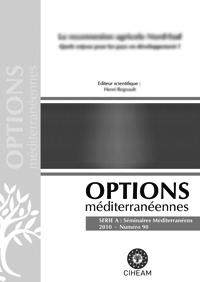| Article précédent | p. 221-226 | Article suivant |
Valorisation of date-palm by-products (DPBP) for livestock feeding in Southern Tunisia. I-Potentialities and traditional utilisation
This project aimed to characterize the quantitative and qualitative potentialities of date-palm by-products (DPBP: wasted dates, stones, floral stems, panicles and leaves), and their traditional uses for livestock feeding in the oasis. Individually, DPBP are unbalanced: high energy content or high fibre content, and low crude protein. In vitro dry matter digestibility is high for wasted dates and low for regime supports. 84 farmers were surveyed. They utilize mainly three types of DPBP: wasted dates, a mix of these and palms, and a mix of all DPBP. Some camelid farmers buy date stones. Products were offered without treatment, soaked in water, or mixed with other feeds. Farmers used DPBP each year during winter, all the year or only during dry years. 16 percent of farmers consider DPBP as a security fodder. Quantities distributed are variable. The two main limitations concerned bloating when distributed with concentrates or bran, and seasonal unavailability.
- [ Afficher ]
- [ Télécharger ]
- [ Exporter la citation ]
Vous pouvez télécharger la citation au format :
- [ Imprimer ]
-
Mots-clés
COMPOSITION CHIMIQUE, PHOENIX DACTYLIFERA, SOUS-PRODUIT, TUNISIE, ZONE ARIDECiter cet article
Genin D., Kadri A., Khorchani T., Sakkal K., Belgacem F., Hamadi M. Valorisation of date-palm by-products (DPBP) for livestock feeding in Southern Tunisia. I-Potentialities and traditional utilisation. In : Ben Salem H. (ed.), Nefzaoui A. (ed.), Morand-Fehr P. (ed.). Nutrition and feeding strategies of sheep and goats under harsh climates . Zaragoza : CIHEAM, 2004. p. 221-226. (Options Méditerranéennes : Série A. Séminaires Méditerranéens; n. 59). 9. Seminar of the Sub-Network on Nutrition of the FAO-CIHEAM Inter-Regional Cooperative Research and Development Network on Sheep and Goats, 2001/11/08-10, Hammamet (Tunisia). http://om.ciheam.org/om/pdf/a59/04600032.pdf



